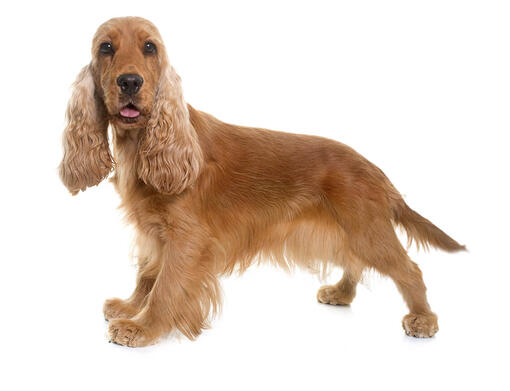
Cocker Spaniel (English)
English Cocker Spaniels are medium-sized, well-balanced dogs. Their coats are flat and silky with plenty of feathering on the front legs.
The need-to-know
- Dog suitable for non-experienced owners
- Some training required
- Enjoys vigorous walks
- Enjoys walking more than two hours a day
- Medium dog
- Some drool
- Requires grooming every other day
- Non hypoallergenic breed
- Chatty and vocal dog
- Not a guard dog
- May require training to live with other pets
- Great family dog
Personality

The Cocker Spaniel is a busy, friendly dog who thrives on human companionship, wanting nothing more than to please their owners. They are ideal pets where there are children about and they get on well with other household animals.
Cocker Spaniels are a very happy breed, constantly wagging their tails and always on the go. They are easily trained, being both clever and eager to learn.
History and Origins

Country of Origin: England
The English Cocker Spaniel is the most popular of the spaniel breeds and is one of the oldest of the land spaniels. Prior to the early 1800, the Cocker and the Springer Spaniel’s were categorised together and called simply the Land Spaniel but they developed to have different jobs depending on their size - the larger ones being used to ‘spring’ game and the smaller ones to flush out woodcock. The difference between the two became more pronounced thanks to selective breeding by their various devotees, and in 1893, they were finally recognised as two separate breeds - and this is how they got the names we know today - the Springer and the Cocker.The advantages of the Cocker were that as they were smaller and faster, they could easily push themselves into hedgerows and dense scrubland and so flush game that larger spaniels were unable to get to.
Nutrition and Feeding

Your dog's diet needs to have the right balance of all the main nutrient groups including a constant supply of fresh water. It's also important to conduct regular?body condition?scores to ensure you keep your dog in ideal shape and remember to feed them at least twice daily and in accordance with the feeding guidelines of their particular food.
Exercise

The Cocker Spaniel is active, busy, energetic dog who loves exercise and needs between an hour to two hours every day although will happily take more - but will still enjoy games, training, interactive toys and being involved in all family activities at the rest of the time too.
Other Information

Health and common issues
One of the most common problems encountered in the English Cocker Spaniel is recurrent ear infections, due to their large ear flaps. As with many breeds, they can suffer from various hereditary eye disorders, and hip dysplasia (a condition that can lead to mobility problems). Eye testing and hip scoring of dogs prior to breeding is therefore important. The breed club monitor the health of the breed carefully and should be contacted for the most up-to-date information and details of any DNA or additional testing they recommend. Breed Clubs can be found on the Kennel Club website.
Space requirements
While they are fairly small dogs, they really need a country home - or certainly a semi-rural environment so they can get the exercise they need.
Training cocker spaniels
This is an active dog who will need training if you want any hope of a quiet life! They are a joy to train however as they are intelligent and love working with their owner - but they will learn bad habits as quickly as good ones so reward-based training should start early and be ongoing. This is a great breed for dog sports such as agility or even pet gundog work - and they will love having an active job to do. They will enjoy scent work games too. It is important to train a Cocker Spaniel to enjoy handling and grooming (as they will need a lot of it) and to happily give up any prizes they may rather hold onto - always using positive, reward-based methods. Given they have a working gundog background, they should be well socialised with cats (who they can learn to live with happily) but watched with caution around other small animals and birds.
Best family dog breeds
Cocker Spaniels make great family dogs for active energetic families - but tend to need too much exercise and input for parents of younger children so may suit slightly older children better. While many dogs are traditionally thought of as being good with children, all dogs and children need to be taught to get on with and respect each other, and be safe together. Even so, dogs and young children should never be left alone together and adults should supervise all interactions between them.
Did you know?
- There are two very different types of Cocker Spaniel - the English Cocker Spaniel and the American Cocker Spaniel. Enthusiasts on both sides of the Atlantic argue about which one is the ‘real’ one!
- Cocker Spaniel’s paw pads inspired the sole for the first ever boat shoes when Paul Sperry witnessed his dog running on ice without a problem.
- Lady, from Lady and the Tramp was a Cocker Spaniel.
- George Clooney has a Cocker Spaniel called Einstein.
- They make terrible guard dogs as they’re much too friendly.